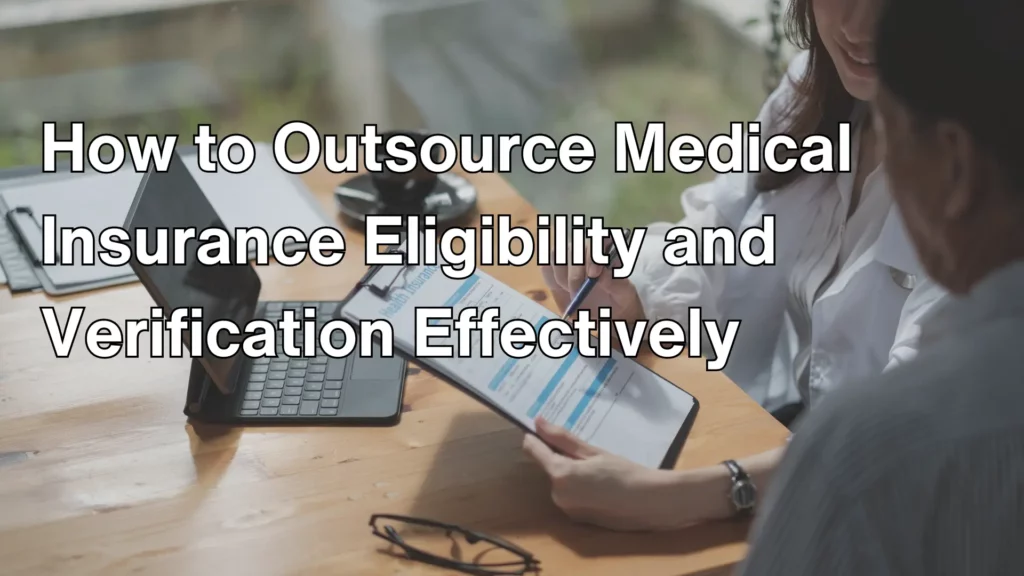We equip you with outsourcing solutions distinctly designed for your business and your customers’ needs.

Outsourcing medical insurance eligibility and verification is one of a healthcare practice’s most brilliant moves. It saves time, reduces errors, and helps ensure smoother revenue cycle management. But doing it effectively? That’s where strategy comes in. Whether you’re dealing with frequent claim denials, overwhelmed administrative staff, or just looking to improve cash flow, outsourcing your insurance verification services can be a game-changer—if done right.
Insurance verification confirms a patient’s coverage details before medical services are provided. This includes checking if the patient’s policy is active, what treatments or services are covered, co-payments, deductibles, and any prior authorization requirements. Without this step, healthcare providers risk claim denials, delayed payments, and billing confusion, which can frustrate staff and patients.
Healthcare providers have enough on their plates—insurance verification helps keep finances clear for everyone involved.
Making insurance verification a priority reduces hassle, lowers risk, and keeps things running smoother.
A big part of insurance verification is prior authorization—getting approval from an insurance provider before performing specific procedures. If prior authorization isn’t handled correctly, it can lead to claim denials, delayed treatments, and unhappy patients.
To cut down on denials:
Staying ahead of prior authorization helps avoid delays, reduce denials, and keep everyone on the same page.
Revenue cycle management (RCM) is how healthcare providers track patient revenue from appointment scheduling to final payment. Insurance verification plays a massive role in this because it directly impacts:
A strong insurance verification process keeps your revenue cycle running efficiently, leading to fewer denials, faster payments, and lower administrative burdens.
Automation completely changes the game for insurance verification. Instead of wasting time on hold with insurance companies or dealing with clunky payer portals, automated systems check eligibility in real time.
Bringing in automation makes insurance verification quicker, easier, and way less of a headache.
Many healthcare providers try to handle insurance verification in-house, but it’s a time-consuming and error-prone. That’s why outsourcing to a specialized provider makes so much sense. Here’s a closer look at what you gain.
Insurance verification isn’t just some quick task—it’s about knowing all the little details of different payer rules, keeping up with constant changes, and figuring out tricky coverage stuff. When you outsource to experts, you’ve got people who actually know what to watch for, so fewer mistakes and less stuff are slipping through the cracks.
Most outsourcing providers use top-tier software integrating electronic health records (EHR) and practice management systems. These tools perform real-time eligibility verification, flag inconsistencies, and ensure smooth billing processes.
As your practice gets busier, so does all the paperwork. Instead of spending time hiring and training more staff, outsourcing helps you keep up with more patients without the extra hassle or cost.
Bringing on full-time staff for insurance verification means paying salaries, benefits, and training costs. Outsourcing skips all that and keeps things more budget-friendly.
Because outsourcing companies focus solely on verification, they can complete tasks much faster than an in-house team juggling multiple responsibilities.
 Once you’re convinced that outsourcing is the way to go, the next step is ensuring you do it correctly. Here’s how to make it work smoothly.
Once you’re convinced that outsourcing is the way to go, the next step is ensuring you do it correctly. Here’s how to make it work smoothly.
Before picking a provider, take a look at where you’re struggling. Are claim denials piling up? Do you need faster eligibility checks? Knowing your biggest headaches makes it easier to find the right outsourcing partner.
Not all outsourcing services are equal, so picking the right one matters. Look for a provider that knows medical insurance verification, has a history of cutting down denials, and follows HIPAA and other rules. Automation and AI can also make the process smoother, helping with accuracy and efficiency.
To avoid miscommunication, set clear expectations upfront. Decide how patient info will be shared securely, set a turnaround time for verifications, and determine how disputes will be handled. Laying it all out early keeps things running smoothly.
Even if you outsource, you can’t just set it and forget it. You’ve got to stay involved to keep things running smoothly. Set up key benchmarks—like how accurate the verifications are, how long they take, and whether they’re helping cut down on claim denials. Checking in regularly makes sure your provider is doing their job and keeping your revenue cycle on track.
Since insurance verification involves private patient information, you’ll want to make sure your outsourcing partner follows HIPAA rules to keep everything secure and confidential.
Real-time insurance checks are a game-changer in busy healthcare settings. They let providers instantly confirm a patient’s coverage, cutting down on delays and guesswork. This is especially helpful for emergency visits, last-minute appointments, and packed practices that don’t have time to verify everything by hand.
As a healthcare provider, outsourcing insurance verification takes work off your plate, reduces errors, and keeps your finances in check. Peak Outsourcing handles eligibility verification to reduce claim denials, keep your revenue flowing, and make things easier for your patients. Want a smoother process? Check out our contact page and reach out today.
Your company may benefit from outsourcing certain functionality that you currently perform in-house. The resulting benefits can transform the way you do business and provide a greater focus on your core business functions.
Submit a contact form or call Peak Outsourcing today at